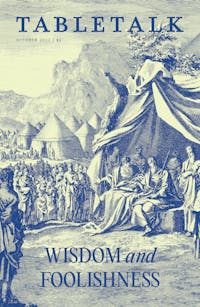
Request your free, three-month trial to Tabletalk magazine. You’ll receive the print issue monthly and gain immediate digital access to decades of archives. This trial is risk-free. No credit card required.
Try Tabletalk NowAlready receive Tabletalk magazine every month?
Verify your email address to gain unlimited access.
In our digitally dependent age, information comes at us constantly from every direction and, it often seems, with ever-increasing rapidity. Never before in history have we had such an abundance of information that we can so easily access, and yet never before in history has there been such a lack of wisdom.
In fact, it often seems that there are many who do not even see wisdom as something that they should aspire to possess. In many respects, Western culture has ignored the pursuit of wisdom for so long that even the word wisdom has almost completely disappeared from its vocabulary. We live in a culture that rebels against the wisdom of the aged and revels in the foolishness of the elementary.
Part of the problem is the idea that knowledge equals understanding and that understanding equals wisdom. Shortcuts such as a web search or echoing the perspective of social media gurus or celebrities provide superficial knowledge that often satisfies people today. This is not only a problem in the world; it is a problem in the church. Thus, we must patiently teach our young people that knowledge comes from gaining information through listening, watching, study, and experience, but knowledge is not an end in itself. We gain knowledge so that we might process and interpret it based on our values, principles, and beliefs. In this way, we will grow in our understanding of that knowledge and how it affects, informs, and applies to our lives.
Wisdom follows on understanding as we rightly discern how to apply our understanding to make right decisions. Wisdom and discernment are close companions, and although we can distinguish them, we cannot ultimately separate them. Moreover, discernment is not only the ability to choose right from wrong; it is the ability to choose right from almost right. Similarly, one of the closest companions to wisdom, a companion without which true wisdom cannot exist, is humility, the virtue whereby we recognize that we lack wisdom and must acquire it.
To gain wisdom, we must first know that we need it. That is why Scripture warns us against being wise in our own eyes and teaches us that the Lord hates haughty eyes (Prov. 3:7; 6:17–18). Pride is the enemy not only of humility but of wisdom. Our culture pridefully revels in foolishness, for their foolish hearts are darkened (Rom. 1:21). For Christians, however, our path is humility, and only that path leads to wisdom and ultimately to doxology coram Deo, before the face of God.
